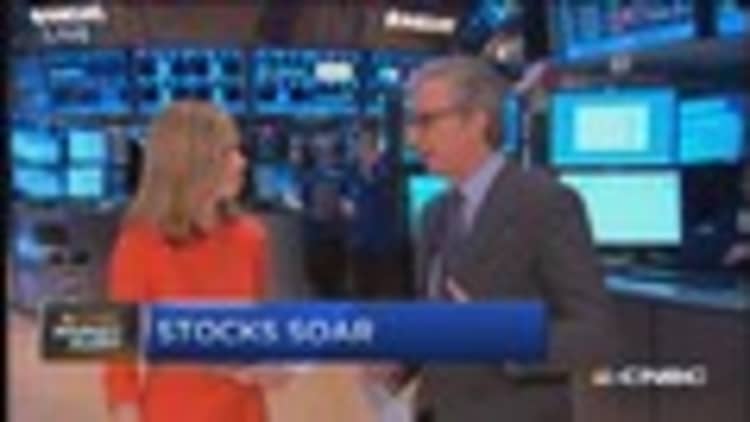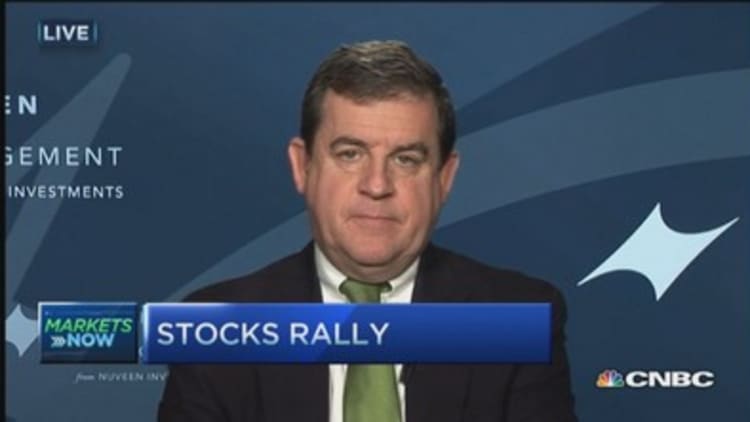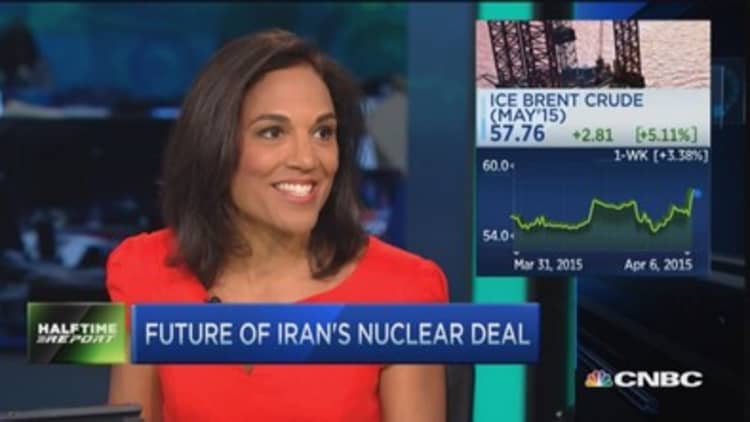


U.S. stocks closed higher on Monday, rebounding from initial losses on the disappointing jobs report as weak data renewed hopes of a delayed increase in interest rates.
"When (jobs) misses by so much and there's negative adjustments to the months that preceded it there's a concern at the back of your mind It's a moronic (plunge) into stocks (that say) because the economy is bad the Fed has to hold off," said Robert Pavlik, chief market strategist at Boston Private Wealth. "I'd rather be in a car that's moving forward."
The major averages turned positive in early trade as the morning's service sector and manufacturing data continued to indicate moderate growth. Traders took the lack of significant growth as a sign of further dovish policy from the Federal Reserve.
Read MoreA short-covering rally, but earnings a big worry
"This puts September much more in play than June, if June was ever in play," said Mark Luschini, chief investment strategist at Janney Montgomery Scott.
With the weaker jobs report, PNC's economics team pushed back its expectations of a rate hike to September from the previous estimate for a July liftoff.
"The labor market is getting better. It's not where we want it to be but definitely getting to the right place," said Gus Faucher, senior macroeconomist at PNC Financial Services. "What the Fed wants to see is further indications that there's tightening in the job market and slack being absorbed," he said
One encouraging sign is the market share of part-time employees peaked at 6.6 percent in 2010 and is now down to 4.5 percent, Faucher said. He noted the economy should see "above-trend growth for the rest of the year."
Crude oil settled up 6.11 percent, or $ 3.00, at $52.14 a barrel as investors cheered signs of increased pressure on supply from Iran and Saudi Arabia. The gains lifted energy stocks about 2 percent as the leading sector in the S&P 500.
Investors also found encouragement from the U.S. dollar, which held steady while the euro traded near $1.09. The greenback is down nearly 2 percent for April after rapid advances earlier in the year.
A "no longer rising dollar is encouraging," said Nick Raich, CEO of The Earnings Scout. "I think the rally today is (investors thinking) the jobs number is so bad the Fed goes on pause and that gives relief for the dollar."
US dollar index - April performance
The U.S. 2-year Treasury yield traded near 0.50 percent while the U.S. 10-year Treasury yield gained to hold 1.91 percent, up from 1.85 percent earlier.
The Dow Jones industrial average closed up more than half a percent higher on Monday, holding in the black for the year. The blue chip index gained as much as 187 points after falling triple digits in the open.
"I don't know why bad (economic) news continues to be good news," said Peter Boockvar, chief market analyst at The Lindsey Group, who noted the weaker dollar.
Markets were closed on Friday and stocks opened sharply lower on Monday, following futures that plunged after the monthly employment report showed the addition of 126,000 jobs, far below the estimated 245,000 from a Reuters poll.
"The theme of 'data dependent' is back in the market," said Peter Cardillo, chief market economist at Rockwell Global Capital. He still expects the Federal Reserve to raise rates in the second half of this year, but said that weaker economic data could push a rate hike out to 2016.
The was 56.5 in March, its lowest level in three months but in line with estimates. The Markit Purchasing Managers Index rose to 59.2 in March, the highest level since August.
On Tuesday, traders will eye the Job Openings and Labor Turnover Survey (JOLTS) as one of the few other economic indicators coming out this week.
"We really don't get much (data) this week. That's why we're getting a bigger reaction (in stocks)," said Art Hogan, chief market strategist at Wunderlich Securities. Stability in the dollar cross "is helping markets as well."
The strong dollar weighed on corporate profits last quarter and is expected to continue to be a headwind. Analysts are also watching for the effects of lower oil prices.
Alcoa reports quarterly results this Wednesday in the unofficial start to the earnings season.
"The dollar is a little softer. It should be a lot softer," said Peter Schiff, CEO of Euro Pacific Capital. "The biggest disconnect is that people actually think the U.S. economy is recovering" and will lead to a rate hike soon.
Read MoreBad news turns good for 'Fed addicted' stocks
European markets were closed for both Good Friday and Easter Monday. Asian stocks outside Japan gained on hopes the weak jobs report would push out a rate hike by the Federal Reserve.
U.S. stock futures continued to indicate a lower open following remarks by New York Federal Reserve President William Dudley that the central bank will watch subsequent data to see if March's report was an aberration or an indicator of greater economic weakness. Weekly jobless claims have held to lower levels and had suggested a stronger read on monthly nonfarm payrolls.
Dudley was the first Fed official to speak publicly since the March labor report.
Over the weekend, Greece's finance minister told reporters in Washington after a meeting with International Monetary Fund managing director Christine Lagarde that the country "intends to meet all obligations to all its creditors, ad infinitum." Athens is due to pay the IMF 450 million euros ($494 million) Thursday.
Read MoreGreece needs deal by April 24: Varoufakis
In U.S. corporate news, Tesla delivered 10,030 vehicles during the first quarter, its highest quarterly total ever and a 55 percent increase over the first quarter of 2014.
Lorillard and Reynolds American closed higher as investors sought guidance on whether a proposed merger between the tobacco giants will be allowed to proceed. The stocks fell in recent weeks on sentiment that it would be rejected, but reports emerged late last week that the FTC was leaning towards a proposed compromise that would allow it to go through.
Major U.S. Indexes
The Dow Jones Industrial Average closed up 117.61 points, or 0.66 percent, at 17,880.85, with Microsoft leading advancers and Johnson and Johnson the greatest of five blue chip laggards.
The closed up 13.67 points, or 0.66 percent, at 2,080.63, with energy leading all 10 sectors higher. Utilities was the second highest sector and financials gaining the least.
"That is a play on interest rates," Kim Forrest, senior equity analyst at Fort Pitt Capital, said of the gains in utilities. Investors are "likely buying those things for yield."
The Nasdaq closed up 30.38 points, or 0.62 percent, at 4,917.32.
The CBOE Volatility Index (VIX), widely considered the best gauge of fear in the market, traded near 14.
For every three advancers about one declined on the New York Stock Exchange, with an exchange volume of 883 million and a composite volume of 3.2 billion in the close.
Gold futures settled at $1,218.60 an ounce, its highest since February 13.
—Reuters and CNBC's Peter Schacknow contributed to this report.
On tap this week:
Monday
Earnings: A. Schulman
Tuesday
Earnings: International Speedway, Schnitzer Steel, Dave and Buster's
8:50 a.m.: Minneapolis Fed President Narayana Kocherlakota
10:00 a.m.: JOLTS
1:00 p.m.: $24 billion 3-year note auction
3:00 p.m.: Consumer credit
Wednesday
Earnings: Alcoa, Family Dollar, Rite Aid, Bed Bath and Beyond, Pier 1 Imports, Global Payments, RPM International
8:00 a.m.: Fed Gov. Jerome Powell on challenges for monetary policy
10:00 a.m.: New York Fed's Dudley on economy
1:00 p.m.: $21 billion 10-year note auction
2:00 p.m.: FOMC minutes
Thursday
Earnings: Walgreen Boots Alliance, Constellation Brands, Ruby Tuesday, PriceSmart
8:30 a.m.: Initial claims
10:00 a.m.: Wholesale trade
1:00 p.m.: $13 billion 30-year auction
Friday
8:30 a.m.: Import prices
8:45 a.m.: Richmond Fed President Jeffrey Lacker on economic outlook
12:20 p.m.: Minneapolis Fed's Kocherlakota
2:00 p.m.: Federal budget
More from CNBC.com:


